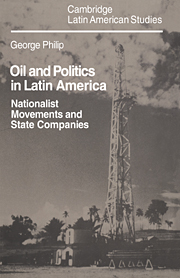Book contents
- Frontmatter
- Contents
- List of tables
- Preface
- Glossary
- Abbreviations
- Note on currencies and other units of measurement
- Maps: Latin America in 1920, 1940, 1960 and 1981; showing importing countries, exporting countries and countries self-sufficient in oil
- Introduction: The politics of oil in twentieth-century Latin America
- Part I The world oil environment
- Part II The major expropriations
- Part III The state oil companies
- 17 Pemex in Mexican politics 1938–79
- 18 The development of Petrobrás: oil company to conglomerate?
- 19 ypf 1932–1979: public enterprise or bureaucracy?
- 20 Petroperú 1968–80: achievements and hard lessons
- 21 ypfb and the development of oil in Bolivia
- 22 Petrovén: the birth of a giant
- 23 State oil companies in Latin America
- 24 Concluding reflections
- Notes and bibliography
- Index
- CAMBRIDGE LATIN AMERICAN STUDIES
17 - Pemex in Mexican politics 1938–79
Published online by Cambridge University Press: 23 December 2009
- Frontmatter
- Contents
- List of tables
- Preface
- Glossary
- Abbreviations
- Note on currencies and other units of measurement
- Maps: Latin America in 1920, 1940, 1960 and 1981; showing importing countries, exporting countries and countries self-sufficient in oil
- Introduction: The politics of oil in twentieth-century Latin America
- Part I The world oil environment
- Part II The major expropriations
- Part III The state oil companies
- 17 Pemex in Mexican politics 1938–79
- 18 The development of Petrobrás: oil company to conglomerate?
- 19 ypf 1932–1979: public enterprise or bureaucracy?
- 20 Petroperú 1968–80: achievements and hard lessons
- 21 ypfb and the development of oil in Bolivia
- 22 Petrovén: the birth of a giant
- 23 State oil companies in Latin America
- 24 Concluding reflections
- Notes and bibliography
- Index
- CAMBRIDGE LATIN AMERICAN STUDIES
Summary
In a political system as centralised and finely balanced as that of Mexico, the position of a major public sector company is particularly interesting. For Pemex itself, the question is how far the technical and financial needs of the state agency could be fulfilled within the fairly tight constraints of Mexican politics. For other sections of the Mexican government the emphasis has appeared differently; how could effective political control be maintained over this agency without the danger of seriously damaging its performance? For outside observers, the nature of this relationship casts an interesting light on the whole question of state ownership of the oil industry: if Pemex can be accounted a success, then what conditions have made this possible? If a failure, then what have been the most important obstacles?
Pemex in formation 1938–50
The birth of Pemex was not easy and the prospects of the infant were not generally regarded highly. Indeed, the us government took so dim a view of its future that it sought only to contain the agency in the expectation that it would eventually die an almost natural death. The early Pemex was itself deformed; it was well endowed with crude oil reserves, but there were difficulties with transportation equipment and a serious lack of refineries in a suitable condition to supply the increasingly important domestic market. Moreover, most of the senior technical and administrative staff of the companies were foreign and left Mexico at the time of the expropriation.
- Type
- Chapter
- Information
- Oil and Politics in Latin AmericaNationalist Movements and State Companies, pp. 329 - 367Publisher: Cambridge University PressPrint publication year: 1982



